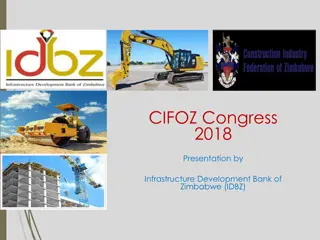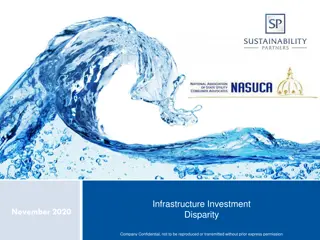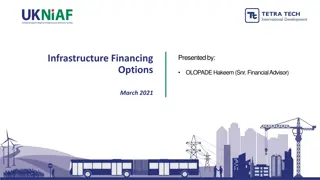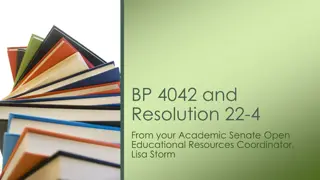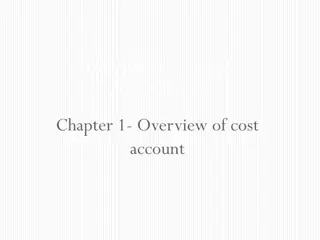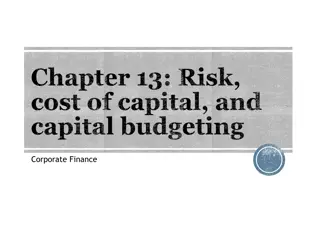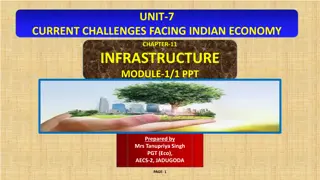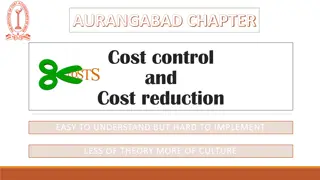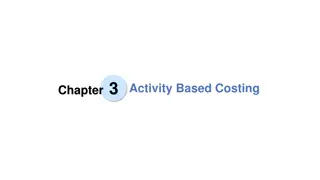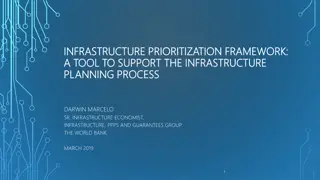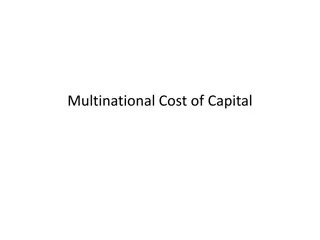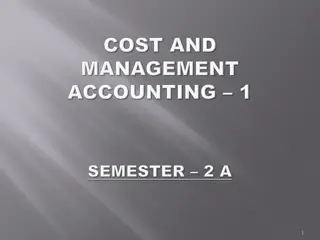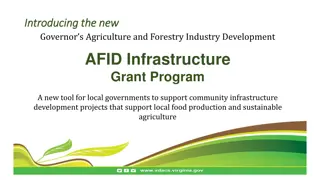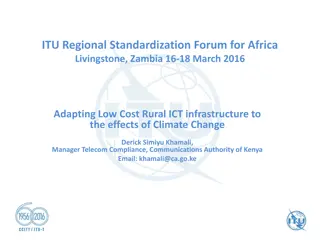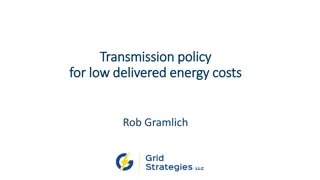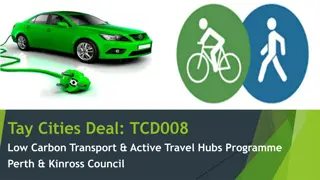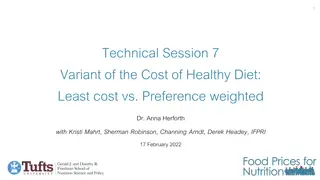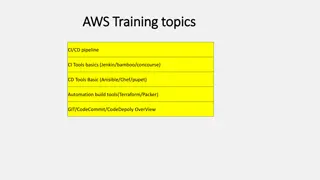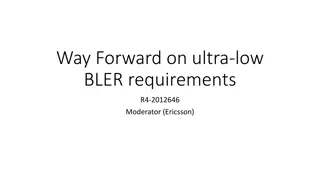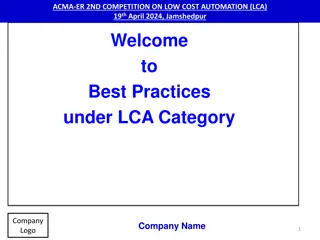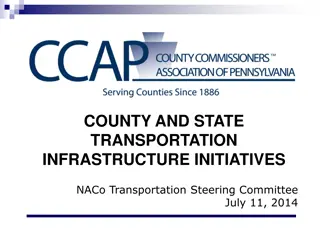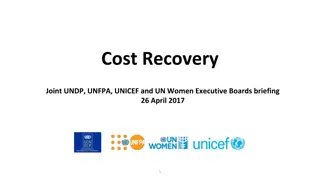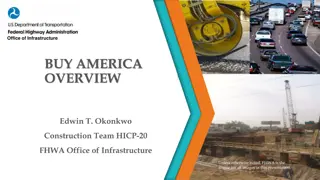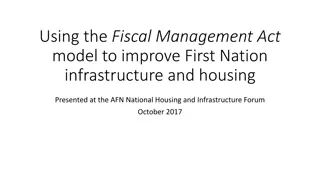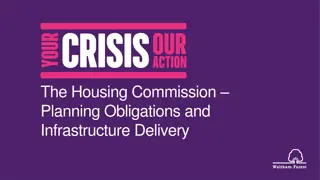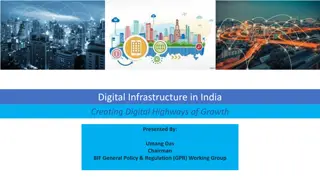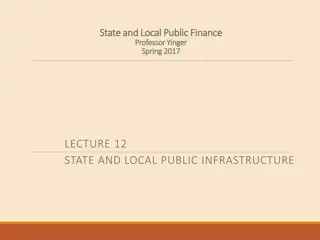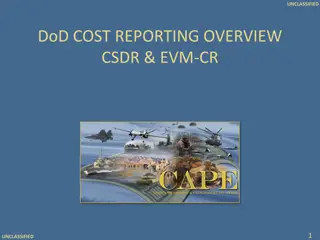Challenges and Progress in Chilean Infrastructure Development
The challenges of Public-Private Partnerships (PPPs) in Chile within the framework of best practices and international standards are discussed, highlighting the need for long-term infrastructure planning and enhanced governance. The 2017 OECD Infrastructure Governance Review identified deficiencies
4 views • 40 slides
Infrastructure Programme Implementation Plan (IPIP) - Module 7 Overview
Module 7 of the Infrastructure Delivery Management System (IDMS) focuses on the Infrastructure Programme Implementation Plan (IPIP). It provides guidance to programme managers on applying management principles for effective planning and management of infrastructure projects. The module emphasizes sy
3 views • 33 slides
Sustainable Infrastructure Procurement Practices in South Africa
Explore the intricate process of procuring sustainable infrastructure in South Africa, highlighting the role of Consulting Engineers South Africa (CESA) and the Total Life-Cycle Cost of Infrastructure Ownership. Delve into the legal environment, procurement practices, and experiences from India to e
0 views • 16 slides
Infrastructure Development Bank of Zimbabwe (IDBZ) - Financing Zimbabwe's Infrastructure Needs
The presentation by the Infrastructure Development Bank of Zimbabwe (IDBZ) at the CIFOZ Congress 2018 outlines the critical infrastructure sectors, funding requirements, and the funding gap faced by Zimbabwe. IDBZ is mandated to facilitate infrastructure development in key sectors like ICT, housing,
5 views • 20 slides
Addressing Infrastructure Investment Disparity: Challenges and Solutions
The disparities in infrastructure investment pose significant challenges, with the nation facing an aging infrastructure that requires substantial funding for maintenance and upgrades. Despite the positive economic impacts of infrastructure investments, many communities struggle to access the necess
0 views • 12 slides
Comprehensive Cost Management Training Objectives
This detailed training agenda outlines a comprehensive program focusing on cost management, including an overview of cost management importance, cost object definition, cost assignment, analysis, and reporting. It covers topics such as understanding cost models, cost allocations, various types of an
3 views • 41 slides
Understanding Infrastructure Financing Options and Principles
This presentation discusses the various tools and principles of infrastructure financing, including project finance, corporate finance, public finance, and blended finance. It covers the differences between financing and funding in infrastructure provision, the challenges faced by infrastructure ser
0 views • 32 slides
Academic Senate Resolutions and Low-Cost Thresholds in Higher Education
The Academic Senate addresses the adoption of open educational resources (OER) and low-cost materials to support academic freedom and compliance with legislative requirements. The resolution discusses the definition of low-cost resources and the variability among California Community Colleges in set
3 views • 9 slides
Understanding Cost Accounting Essentials
This overview delves into topics such as financial accounting, classification of accounts, cost ascertainment, and management accounting. It covers the meaning of cost, methods and techniques of costing, advantages and limitations of cost accounting systems, and essentials for a robust cost accounti
4 views • 27 slides
Understanding Risk, Cost of Capital, and Capital Budgeting in Corporate Finance
Explore the concepts of risk, cost of capital, and capital budgeting in corporate finance, including the Capital Asset Pricing Model (CAPM), cost of equity, beta estimation, and cost of capital. Learn how to reduce the cost of capital and understand the impact of reducing the Weighted Average Cost o
1 views • 20 slides
Challenges and Importance of Infrastructure in Indian Economy
Infrastructure is crucial for economic growth in India, encompassing services like transport, power, communication, and more. The differing roles of social and economic infrastructure are outlined, highlighting their impact on human and economic resources. The significance of infrastructure lies in
1 views • 16 slides
Cost Control and Cost Reduction Strategies in Business: Understanding Implementation Challenges
Understanding the concepts of cost control and cost reduction is crucial for businesses, but implementing them can be challenging. This chapter explores the influencing factors for success in cost control and reduction, emphasizing the importance of cultural aspects, leadership, and management appro
2 views • 15 slides
Understanding Activity-Based Costing (ABC) in Cost Management
Activity-Based Costing (ABC) is a strategic costing method that allocates overhead costs to products based on activities. It offers benefits such as accurate cost allocation and identifying cost drivers but also has challenges due to increased complexity and customization. ABC differs from tradition
1 views • 15 slides
Infrastructure Prioritization Framework and Challenges
The Infrastructure Prioritization Framework (IPF) is a tool designed to support the infrastructure planning process, aiming to address challenges such as infrastructure gaps, limited resources, and technical capacity constraints. The tool integrates social, environmental, and financial criteria to h
2 views • 25 slides
Understanding the Cost of Capital in Finance
The cost of capital is crucial for businesses to determine the average cost of their finance. The Weighted Average Cost of Capital (WACC) is used as a discount rate in financial calculations. It involves estimating the cost of each source of finance and calculating a weighted average. Additionally,
0 views • 14 slides
Understanding Multinational Cost of Capital
Multinational corporations determine their cost of capital based on the cost of debt and equity. The cost of debt includes the interest rate and credit risk premium, while the cost of equity reflects the risk premium investors demand. Estimating an MNC's cost of capital involves assessing these comp
1 views • 24 slides
Understanding Cost Accounting: Techniques and Processes
Cost accounting is a specialized branch of accounting that involves the accumulation, assignment, and control of costs. It encompasses techniques like ascertainment of costs, estimation of costs, and cost control to aid in decision-making. Cost accounting plays a crucial role in budgeting, standard
2 views • 11 slides
Understanding Low Band Receive Antennas and the Beverage Flex-4X System
Low band receive antennas, including the Beverage Flex-4X system, are crucial for long-distance propagation on bands such as 160, 80, 60, and 40 meters. Operating on low bands presents challenges like large wavelengths, high levels of QRM and QRN, and the need for effective noise reduction strategie
1 views • 24 slides
Introducing the New Governor's AFID Infrastructure Grant Program
The Governor's Agriculture and Forestry Industry Development (AFID) Infrastructure Grant Program is a new initiative to support community infrastructure projects that promote local food production and sustainable agriculture. Through this program, local governments can access funding to enhance thei
0 views • 24 slides
Introduction to Industrial Costing: Understanding Cost Types and Accounting Systems
Explore the fundamentals of industrial costing, including different cost types and accounting systems such as actual cost accounting, normal cost accounting, and standard cost accounting. Learn about cost data control, tasks of cost accounting, and the integration of cost type accounting in cost and
2 views • 24 slides
Overview of Low-Cost Sensors for Atmospheric Composition Measurement
This publication provides an insightful overview of low-cost sensors for measuring atmospheric composition, covering topics like sensor technologies, applications in atmospheric sciences and air quality management, and evaluation methods. It emphasizes the importance of not only the technical perfor
0 views • 17 slides
Adapting Low-Cost Rural ICT Infrastructure to Climate Change Effects
Explore the adaptation of low-cost rural ICT infrastructure to combat the impacts of climate change, focusing on interdependency, smart sustainability, policy issues, and steps for adaptation in the ICT sector. Concepts like scientific, collaborative, and cost-effective principles are essential for
0 views • 34 slides
Assessing the Value of Low Cost Versus High Cost Soil Moisture Sensors
The study compares the value of low-cost and high-cost soil moisture sensors for precision agriculture, focusing on reliability, accuracy, and noise levels. Various sensor technologies and their prices are evaluated, shedding light on the benefits and drawbacks of different sensors in agricultural a
0 views • 27 slides
Enhancing Transmission Infrastructure for Reliable and Efficient Energy Delivery
Interregional transmission plays a crucial role in ensuring energy reliability and cost efficiency, especially during extreme weather events. Connecting areas with diverse net load reduces costs and enables significant power transfers. Investing in bigger transmission lines leads to lower losses and
0 views • 9 slides
Tay Cities Deal TCD008 Low Carbon Transport & Active Travel Hubs Programme in Perth & Kinross Council
The Tay Cities Deal TCD008 Low Carbon Transport & Active Travel Hubs Programme aims to enhance sustainable travel options in the region, improve connectivity, workforce mobility, and innovation. The three-phase program includes projects like the Broxden Low Carbon Transport Hub, Perth Active Travel
0 views • 12 slides
Understanding Cost Variants in Healthy Diets: Least Cost vs Preference Weighted
The discussion delves into the concept of least-cost versus preference-weighted healthy diets, highlighting the differences in cost and food selection. It explores how preference weighting takes into account food preferences of low-income consumers, providing insights into the affordability and cult
0 views • 18 slides
Managing Summer Cost Share for Faculty with 9-Month Appointments
Explore the process of setting up and monitoring summer cost share for faculty with 9-month appointments. Learn why cost share for summer may not display on the FEC, how GCA establishes cost share using the Cost Share Module, and how departments should adjust the FEC to reflect summer cost share acc
1 views • 15 slides
Introduction to Terraform for Infrastructure Automation
Terraform is a powerful tool used for building, changing, and versioning infrastructure efficiently and safely. It operates based on Infrastructure as Code principles, allowing for versioning of infrastructure configurations like any other code. With features like Execution Plans, Resource Graph, an
0 views • 27 slides
President Trump's $1.5 Trillion Infrastructure Plan: Key Points for Counties
President Trump introduced a $1.5 trillion federal infrastructure package with a focus on regulatory reform, aiming to stimulate new investment, shorten project approval times, and address rural infrastructure needs. The plan includes $200 billion in new federal spending, leveraging funds for projec
1 views • 21 slides
Way Forward on Ultra-Low BLER Requirements in Wireless Communication
Explore the agreements and discussions around ultra-low BLER (Block Error Rate) requirements for URLLC (Ultra-Reliable Low Latency Communication) in wireless communication systems. Gain insights into the test methodologies, decision co-ordinates, applicability rules, and open issues related to CQI (
0 views • 9 slides
ACMA-ER 2nd Competition on Low-Cost Automation (LCA) - 19th April 2024, Jamshedpur
The ACMA-ER 2nd Competition on Low-Cost Automation (LCA) will be held on 19th April 2024 in Jamshedpur. Participants will showcase innovative practices under the LCA category focusing on themes such as safety, quality improvement, cost reduction, and productivity enhancement. The competition aims to
0 views • 18 slides
Transportation Infrastructure Initiatives in Dauphin County
The County and State Transportation Infrastructure Initiatives in Dauphin County include the PennDOT Bridge Bundling Program, Dauphin County Infrastructure Bank, PennDOT Agility Program, and Next Generation Transit Revitalization Investment Districts. The Bridge Bundling Program aims to save time an
1 views • 26 slides
Joint UNDP, UNFPA, UNICEF, UN Women Executive Boards Cost Recovery Briefing
Briefing on cost recovery for the joint Executive Boards of UNDP, UNFPA, UNICEF, and UN Women, covering topics such as feedback on cost recovery, role of core resources, cost recovery models using a LEGO approach, harmonization efforts, guidance for Executive Boards, and next steps towards proposing
1 views • 42 slides
Understanding Buy America Requirements in Federal Infrastructure Projects
This presentation provides an overview of the Buy America requirements as mandated by the Federal Highway Administration (FHWA) and outlined in the Bipartisan Infrastructure Law. The Buy America regulations apply to iron, steel, manufactured products, and construction materials, requiring that these
1 views • 20 slides
Improving First Nation Infrastructure and Housing through Fiscal Management Act Model
The presentation at the AFN National Housing and Infrastructure Forum in October 2017 highlighted the challenges faced by First Nation communities in developing sustainable infrastructure. The current system is inefficient, prompting the exploration of alternatives like the First Nations Fiscal Mana
2 views • 9 slides
Infrastructure Funding Framework and Delivery Plan
This document outlines the mechanisms for funding community infrastructure through tools such as Community Infrastructure Levy (CIL) and Section 106 agreements. It also details financial contributions received since 2010/11, setting spending priorities, and the LBWF Infrastructure Delivery Plan. The
0 views • 13 slides
Digital Infrastructure in India: Creating Pathways for Economic Growth
Digital infrastructure in India plays a crucial role in driving economic growth and development. The focus on creating a national digital grid and catalyzing investments in digital infrastructure is essential for the country's digital transformation. Improving digital infrastructure can unlock signi
12 views • 10 slides
Understanding State and Local Public Infrastructure Finance
Exploring the significance of state and local public infrastructure finance, this lecture discusses the need for investment in long-lived public assets like roads, bridges, water systems, and energy production. It highlights the urgency to address the deteriorating infrastructure in the US and the i
0 views • 33 slides
Defense Cost Reporting and Systems Overview
Defense Cost Analysis and Reporting Systems (CSDR) provide the cost community with essential data for developing independent cost estimates within major defense acquisition programs. The Defense Automated Cost Information Management System (DACIMS) offers instant access to historical cost informatio
0 views • 19 slides
Importance of Cost Accounting in Business Management
Cost accounting plays a crucial role in modern business environments where cost effectiveness and quality consciousness are vital for success. This branch of accounting helps in planning, controlling, and determining the costs of products or services, providing essential data for efficient managemen
1 views • 6 slides



